Key takeaways:
- Embrace beta reader feedback as a valuable tool for growth, viewing it as insights rather than personal criticism.
- Select beta readers with relevant genre knowledge and diverse perspectives to enrich feedback.
- Communicate clear expectations and be open about the type of critique you seek to foster more constructive discussions.
- Reflect on feedback to identify patterns, improving both character development and narrative pacing in future works.
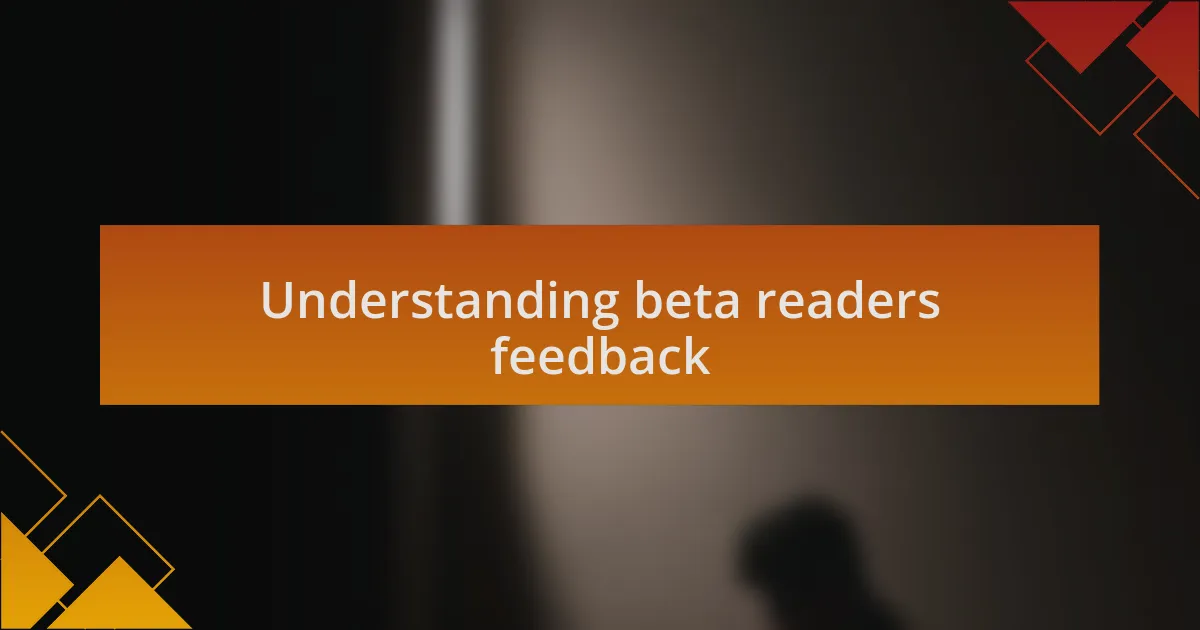
Understanding beta readers feedback
Understanding beta reader feedback can feel overwhelming at first, but embracing it is essential for growth as a writer. I remember my first time sharing my manuscript with beta readers; their comments left me both excited and anxious. Were they seeing the story as I intended, or was I missing the mark entirely? The key is to approach their insights with an open mind and view their feedback as a valuable tool rather than personal criticism.
As I sift through feedback, I often find myself reflecting on the themes that resonate most with my readers. For instance, one beta reader pointed out that a character’s motivations were unclear, which made me pause and consider how my own emotional experiences could better inform my writing. Are there moments in your own life that could add depth to your characters? This kind of thought process not only strengthens your narrative but also fosters a deeper connection with your audience.
Finally, remember that not all feedback will resonate, and that’s completely normal. I once received a critique that suggested I change the entire setting of my story. While I appreciated the feedback, I knew my original vision was integral to the narrative’s identity. It’s vital to filter through suggestions, retaining the essence of your unique voice while incorporating what genuinely enhances your work. How do you determine which feedback aligns with your vision? It’s all about trusting your instincts and knowing your story’s heart.
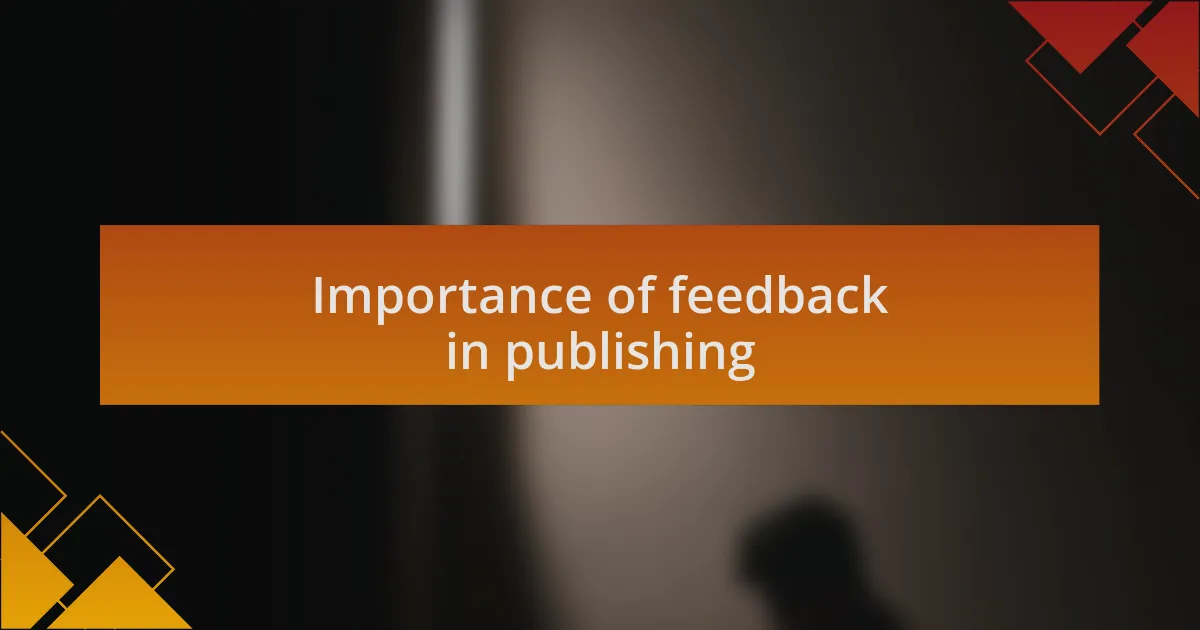
Importance of feedback in publishing
Feedback plays a pivotal role in the publishing process, serving as a mirror reflecting a writer’s strengths and weaknesses. I recall a moment when a beta reader shared their thoughts on the pacing in my novel. Their perspective opened my eyes to areas where I had rushed through key moments, ultimately shaping how I approached revisions. How often do we overlook the rhythm of our own storytelling in favor of getting words on the page?
Moreover, understanding how readers interpret our work can lead to breakthroughs we might have never considered. One beta reader highlighted a theme in my writing I hadn’t consciously introduced. Their insight not only made me realize I was tapping into deeper narratives but also inspired me to further explore that theme in future works. Have you ever been surprised by what your readers pick up on? Those revelations can transform an ordinary manuscript into something extraordinary.
The challenge lies in navigating the relationship between personal vision and external opinions. I vividly remember grappling with mixed feedback on a subplot I loved. While some readers found it compelling, others felt it detracted from the main narrative. This taught me the importance of weighing feedback carefully, asking myself if the subplot truly served the story or if it was just a personal favorite. What aspects of your writing might benefit from a fresh perspective? Embracing feedback thoughtfully can guide you toward clarity and growth as an author.
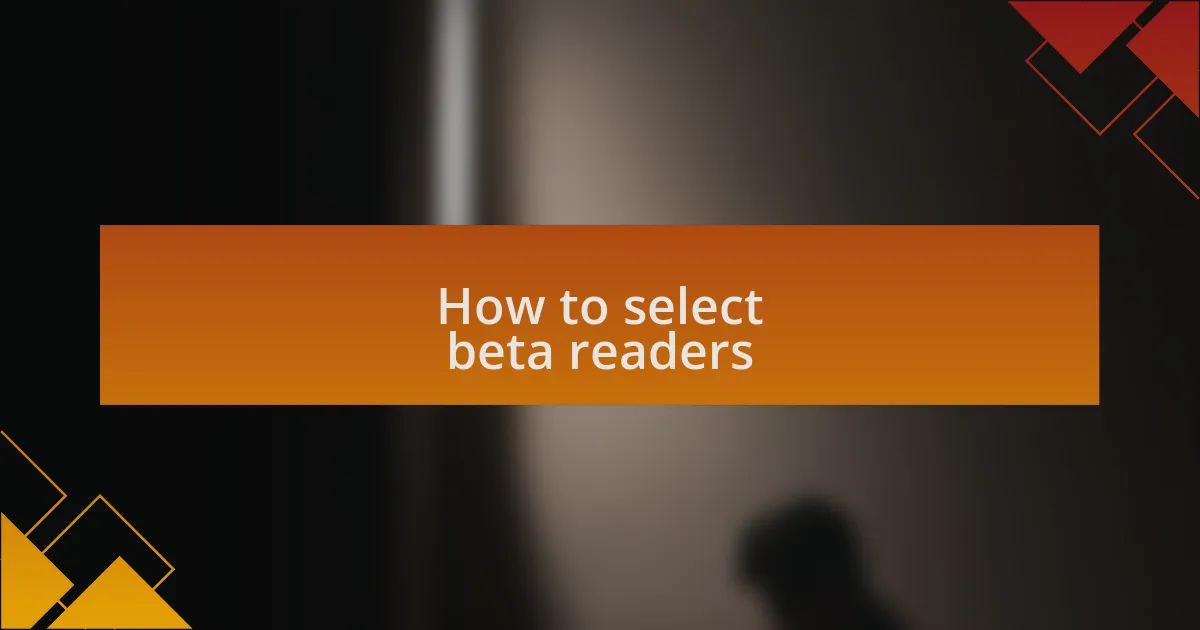
How to select beta readers
Choosing the right beta readers is crucial for getting insightful feedback. I typically look for individuals who are not only avid readers but also understand the genre I’m working in. I once invited a friend who loves thrillers to read my romance draft; while their enthusiasm was infectious, their feedback highlighted how important it is to match beta readers to the specific nuances of my writing. Have you ever considered how genre knowledge can shape the feedback you receive?
Another aspect I consider is diversity among my beta readers. I like to gather opinions from different backgrounds and perspectives to enrich the feedback. For instance, when I received insights from a reader who typically enjoys literary fiction, it helped me discover the subtleties in character development that I might have missed, even though I primarily write genre fiction. This made me wonder, how often do we limit our feedback sources to just those who reflect our own tastes?
Lastly, I encourage creating a comfortable atmosphere for my beta readers. I often use a casual questionnaire that allows them to express their thoughts freely, which can uncover valuable insights. I once had a beta reader hesitant to share their true feelings until I reassured them that all opinions were welcome, leading to a candid discussion that ultimately transformed an entire chapter. Have you made space for your beta readers to express themselves without hesitation?
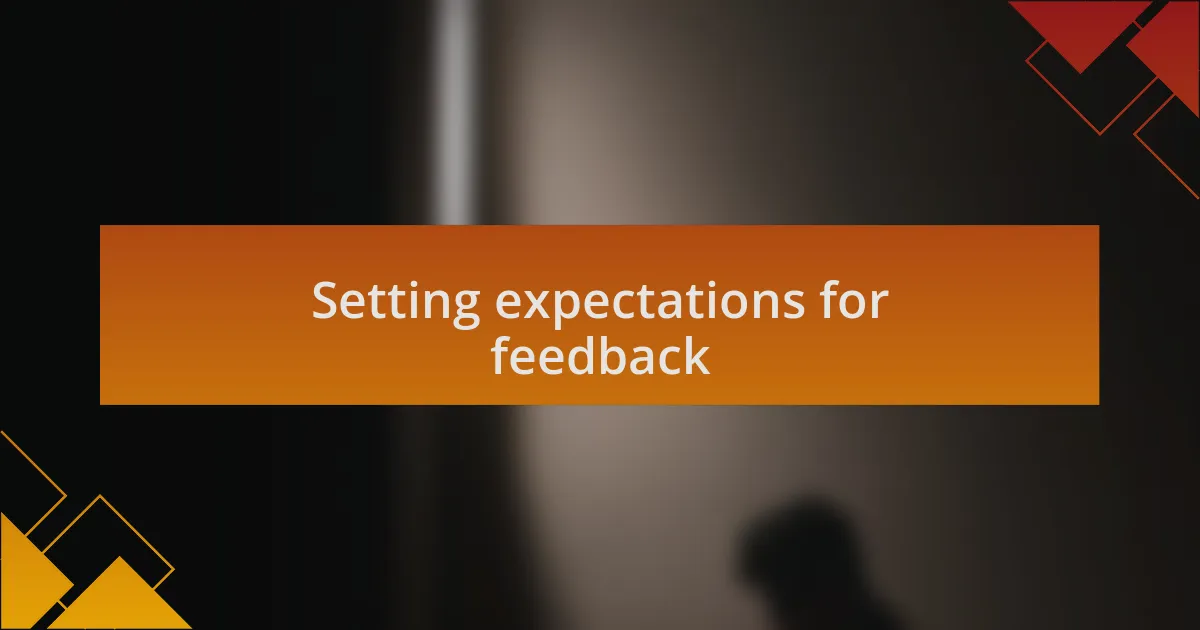
Setting expectations for feedback
Setting clear expectations for feedback is essential to ensure that both you and your beta readers are on the same page. In my experience, I always make it a point to communicate what kind of feedback I’m looking for, whether it’s focused on plot structure, character development, or pacing. I’ve found that when I specify my needs upfront, it leads to more targeted insights and a smoother review process.
It’s also crucial to be open about the level of critique you’re prepared to handle. I recall a time when I was anxious about receiving harsh feedback on a draft that I felt passionate about. By expressing my apprehensions to my beta readers, they adapted their comments to a more constructive tone, which turned out to be exactly what I needed. Have you ever considered how sharing your vulnerabilities could foster deeper connections and more meaningful feedback from your readers?
Lastly, I believe in setting a realistic timeline for feedback. I typically ask my beta readers for their thoughts within a few weeks, understanding that life can get hectic. This way, they feel accountable without feeling rushed. Reflecting on my own experience, I’ve noted that when I allow a bit of flexibility, it often results in more thoughtful and well-rounded critiques. How do you manage the balance between urgency and patience when seeking feedback?
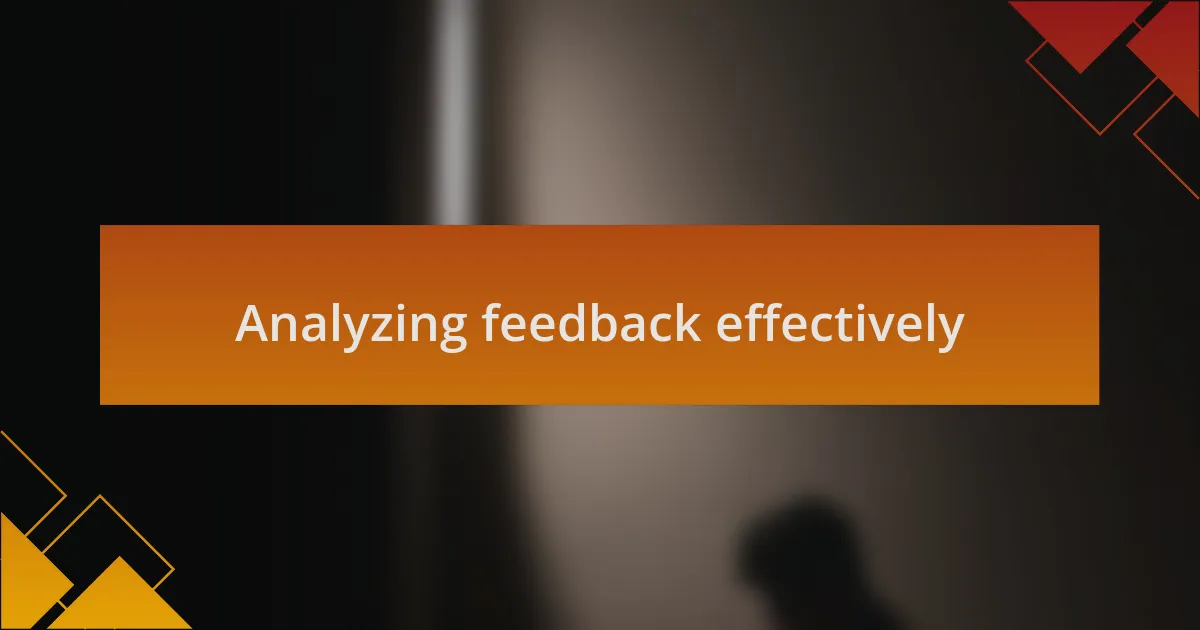
Analyzing feedback effectively
When I dive into analyzing feedback from beta readers, my first step is to sift through their comments with an open mind. I remember a time when a reader pointed out inconsistencies in my character arcs. Initially, I felt defensive, but after reflecting on their insights, I realized they were spot on. Have you ever experienced a breakthrough moment like that, where a piece of feedback completely changed your perspective?
Next, I find it helpful to categorize feedback into themes, such as character development, pacing, and style. This method not only makes it easier to digest but also highlights which areas need the most attention. For instance, in my last manuscript, I identified a recurring concern about pacing in the second act. This allowed me to focus my revisions effectively and prioritize strengthening that section of the story. How often do you find patterns emerging in the feedback you receive?
Finally, I always take the time to prioritize the feedback based on how it resonates with my vision for the story. Not every piece of advice will align with your goals, and that’s perfectly fine. One beta reader suggested a completely different ending, which was compelling, but it deviated from what I had envisioned. Ultimately, trusting my intuition helped me maintain the story’s essence while still considering valuable insights. What strategies do you employ to differentiate between helpful critique and suggestions that may steer you off course?
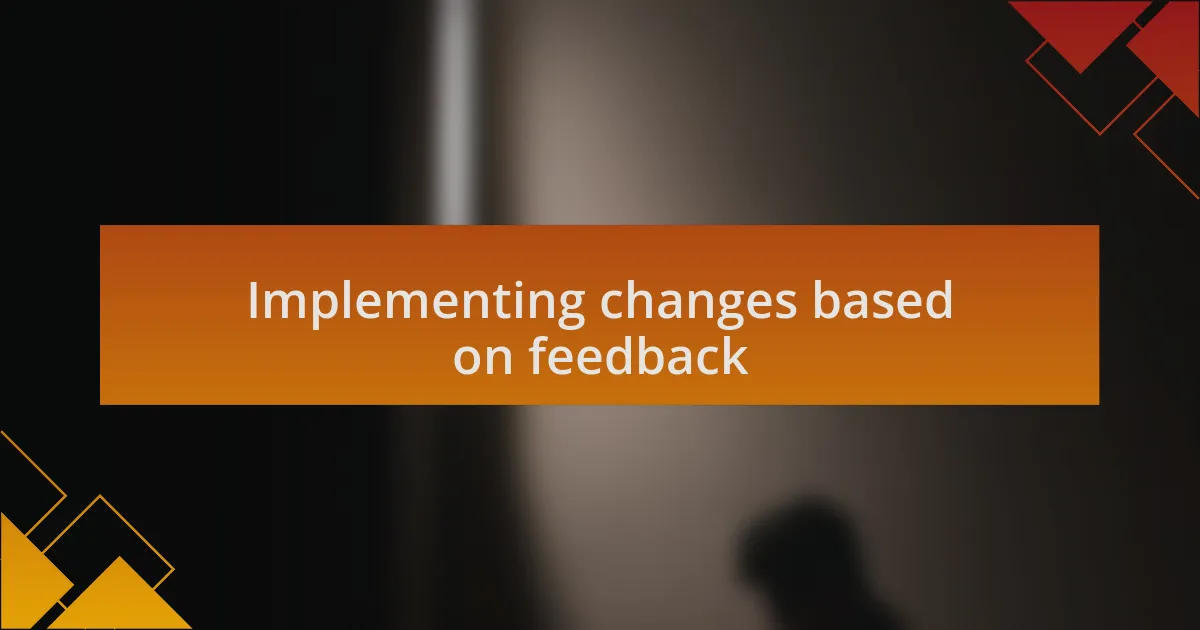
Implementing changes based on feedback
When it comes to implementing changes based on feedback, I often find it overwhelming at first. I recall a time when multiple beta readers pointed out the same issue in my manuscript—too much exposition. It stung a little, but I realized this was a common pitfall among many indie authors. Addressing this feedback forced me to be more succinct and rely on subtext rather than overt explanation. Have you ever had to strip away parts of your writing that you thought were essential?
Once I’ve identified the key areas for change, I treat each piece of feedback as a puzzle piece, carefully integrating them into my narrative. For instance, after receiving critical insights on character dialogues, I revisited scenes to infuse more authenticity. This process often involves rewriting and reimagining scenes, which can be both challenging and rewarding. How do you approach the task of rewriting with readers’ suggestions in mind?
I’ve learned to embrace the iterative nature of this process. Every round of revisions brings me closer to my final vision. I remember feeling exhausted after a particularly rigorous editing session, but when I saw how the changes transformed the story, it filled me with renewed energy and excitement. Have you experienced that invigorating mix of satisfaction and relief when your revisions finally come together? Implementing feedback is not just about adjusting; it’s a chance to deepen my connection to the story and my readers.
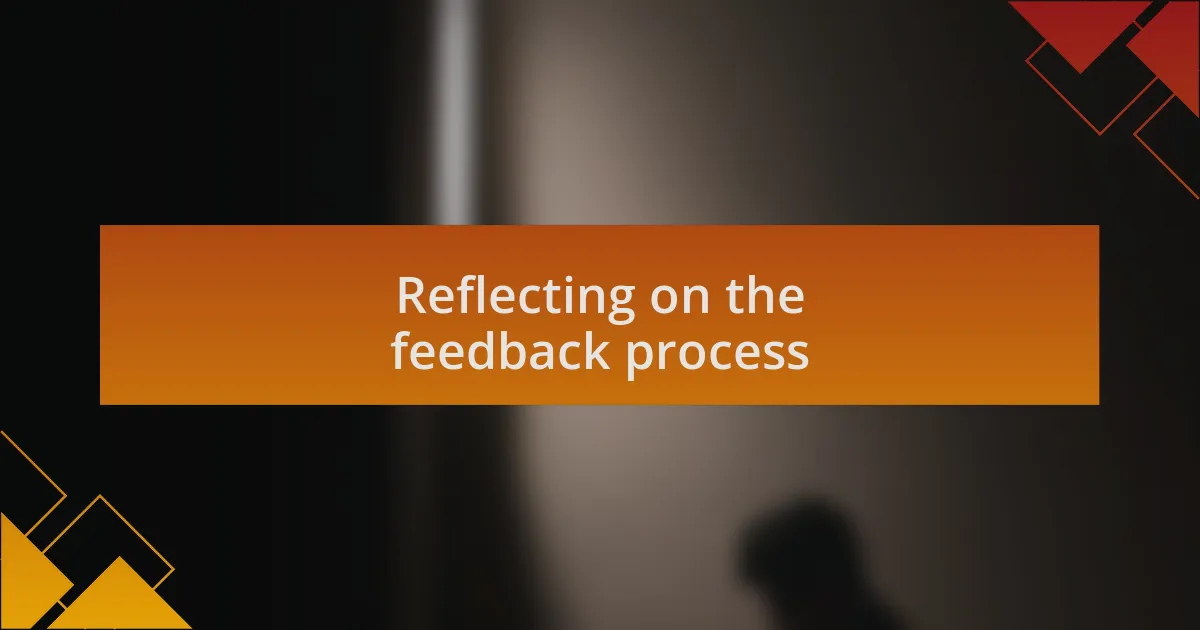
Reflecting on the feedback process
Reflecting on the feedback process has become an essential part of my creative journey. I recall a moment when a beta reader pointed out the pacing in my story; initially, I felt defensive and questioned their understanding. However, as I reread those sections, I began to appreciate their perspective, prompting me to acknowledge that pacing can significantly affect a reader’s engagement. Have you ever had a moment where feedback made you see your work in a new light?
One of the most enlightening aspects of reflecting on feedback is recognizing common threads in the critiques I receive. After a few rounds, I started to see a pattern in the concerns regarding my character development. The realization struck me that my passion for the plot had overshadowed the characters’ emotional journeys. This reflection shifted my focus, helping me understand the importance of character arcs in drawing readers in. Have you noticed similar patterns in the feedback you gather?
I often find that stepping back from my manuscript allows me to process the feedback more thoughtfully. There have been instances where taking a short break resulted in a lightbulb moment, clarifying how to address critical points raised by beta readers. It’s fascinating how a little distance can bring new clarity—like when I walked away from my desk and returned with fresh eyes to see exactly where adjustments were needed. Do you have a strategy for re-approaching your work after receiving feedback?